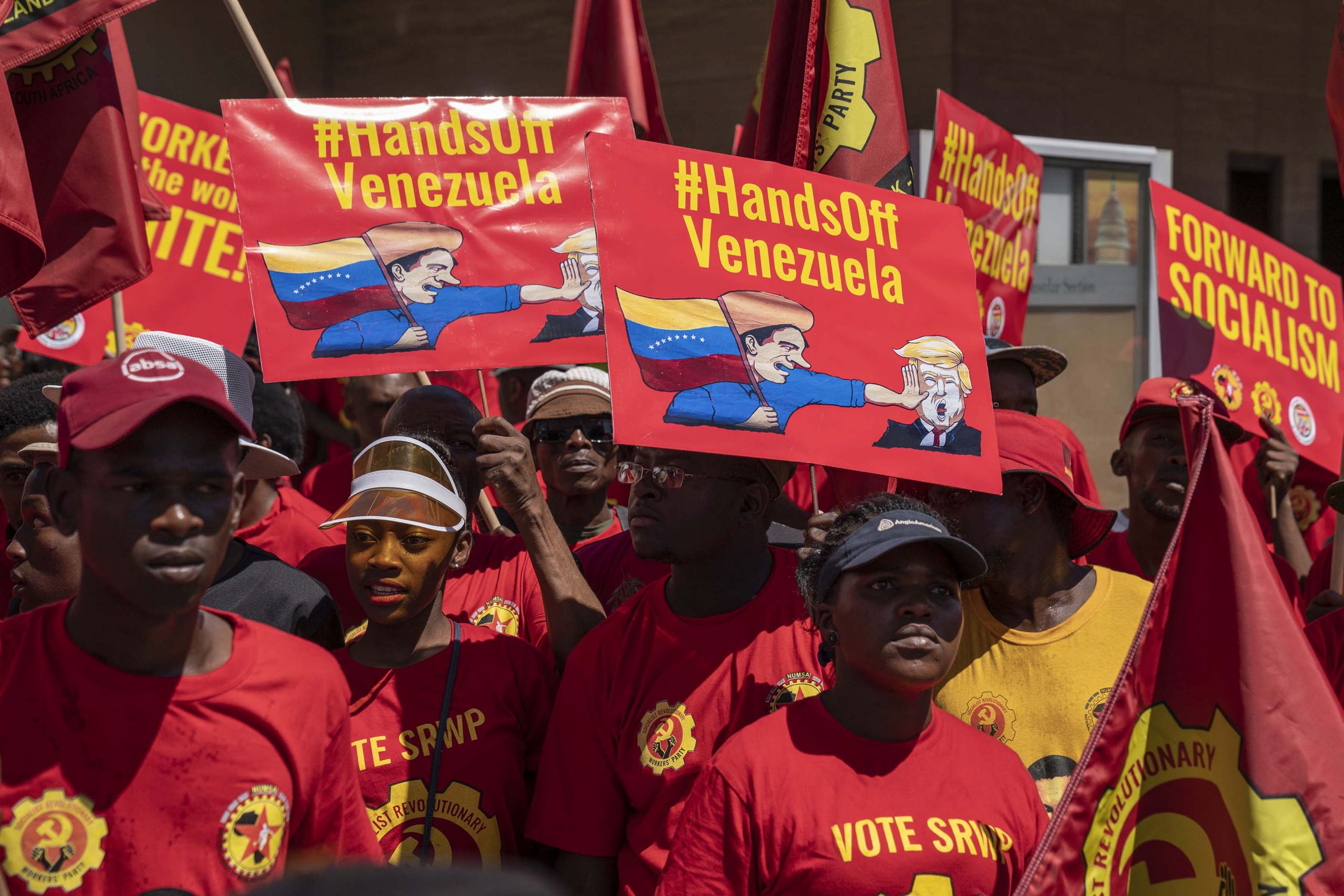Protest against ‘attempted coup’ in Venezuela
Numsa and SRWP members gathered outside the US consulate in Sandton, Joburg, to protest against US involvement and ‘defend the gains of socialism’ in the South American country.
Author:
19 March 2019

On the morning of Saturday 16 March, more than 600 people gathered at the United States consulate in Sandton to denounce what they called an “attempted coup” in Venezuela by the US and their allies.
The National Union of Metalworkers of South Africa (Numsa) and the Socialist Revolutionary Workers Party (SRWP), all wearing red T-shirts, occupied “Africa’s richest square mile”, singing revolutionary songs and chanting slogans in front of the US consulate. The embassy is nestled between two iconic buildings, the elite Sandton City shopping mall and the multibillion-rand Discovery building, which has a 650m running track on the roof.
The SRWP – a new political party that Numsa initiated after its exit from the ANC-led alliance in 2013 – said: “The United States, United Kingdom, Canada and European Union have chosen to ignore the will of the people and are imposing Juan Guaido on to the Venezuelan people as president.”
The US has been hostile towards Venezuela since Hugo Chavez became president in 1999. This hostility deepened as other left-leaning leaders came to power across Latin America, and Chavez sought to build a countervailing regional force to US power.
Popular support, particularly from the urban poor, enabled Chavez to survive an attempted coup in 2002. Repeated allegations have been made of US involvement. The US refused to condemn the attempted coup. Two years later, Jean-Bertrand Aristide, the elected president of Haiti, was successfully removed from office in what is now widely accepted to have been a US-backed coup.
Polarised society
After Chavez died, Nicolás Maduro was elected in April 2013, winning by a margin of 1.6 percentage points. In recent years, Venezuela’s economy has plunged, inflation has rocketed and basic foods and medical supplies are scarce.
Maduro’s supporters point to US sanctions and the decline in the oil price as key reasons for the economic decline. His critics say maladministration is a factor and that the failure to use oil wealth to invest in developing the productive capacities of the country are also factors.
There have been large protests for and against Maduro and Venezuelan society has become increasingly polarised. The US and other detractors of Venezuela claim that Maduro’s re-election in May 2018 was not free and fair.
In January this year, just minutes after Maduro took the oath of office as president of Venezuela, Juan Guaido declared himself the president. He was backed by the US, Britain and Jair Bolsonaro’s government in Brazil.
US President Donald Trump moved quickly to appoint Elliott Abrams – who was convicted of lying to the US Congress about the Iran-Contra scandal and has been linked by a number of analysts to the 2002 attempted coup in Venezuela – as a special envoy to Venezuela. This move was widely interpreted by left-leaning analysts as indicating high-level US support to remove Maduro from office.
In an address to the nation last week, Maduro said: “The United States’ imperialist government ordered this attack … They came with a strategy of war of the kind that only these criminals – who have been to war and have destroyed the people of Iraq, of Libya, of Afghanistan and of Syria – think up.”
According to The Guardian, the US withdrew all remaining diplomatic staff from Venezuela following Maduro’s address.
The situation in the country is rapidly worsening. A nationwide blackout on 7 March halted public transport and shut down airports, telecommunications, the internet and water supplies. Patients in hospitals were left to fend for themselves and supply their own medicines.
‘The brain of a rat’
No official or representative from the US consulate came out to receive the memoranda of demands. SRWP head of policy Azwell Banda said this was an act of arrogance by the US representatives. He described Trump as “having the brain of a rat” and threatened a consumer boycott of American products.
Outspoken MK veteran and former minister of intelligence Ronnie Kasrils made an appearance at the protest and did not hold back in his message of support for Venezuela.
Kasrils reminded people that “the flag you see behind you was the flag that wanted to crush the small socialist Republic of Cuba … Today we are facing yet again a grievous danger, the danger of a world war … because the [American] flag of imperialism wants to slash the people of Venezuela … We are doing our duty here by raising these revolutionary flags and standing in solidarity with the people of Venezuela.”
Numsa spokesperson Phakamile Hlubi-Majola said socialists have a revolutionary duty to defend the gains of socialism in Venezuela.
SRWP acting spokesperson Vuyolwethu Toli said the US has deployed the language of humanitarian aid to justify its imperialism in Venezuela. Through its propaganda machinery, the US has created a warped impression of the Venezuelan state in the world, said Toli.
The SRWP said that if no response was forthcoming from the US consulate, in two weeks’ time the party would intensify its mobilisation against the US.
In Durban
At the same time as the protest was happening in Sandton, Abahlali baseMjondolo discussed the situation in Venezuela at a well-attended assembly at the Surat Hindu Hall in Durban.
One of its members, who had recently visited Venezuela, briefed the meeting on the situation and there was a discussion about possibilities for building solidarity with poor people’s movements in Venezuela.
The South African government’s response to the Venezuelan crisis was made through the Department of International Relations and Cooperation (Dirco).
It affirmed its support of Maduro as the democratically elected leader of Venezuela.
In a statement dated 28 February, Dirco said “an inclusive political dialogue is necessary to resolve the political crisis in Venezuela”.
